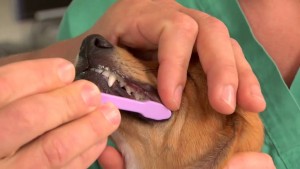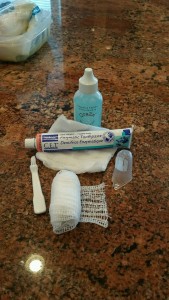
February is National Pet Dental Health month, and begs the question, have you brushed your pet’s teeth lately? This morning I hugged my dog and basked in her warm sweet smell, including her slightly strong ‘doggy’ breath. You might be like me, and that odor may not bother you too much. After all, it seems like a ‘normal’ part of having a pet. However, it’s really not normal. The concern is not the odor so much as what it could indicate, possible dental disease. Time brush her teeth and examine her closely for any signs of infection!
Now you may not be able to see the subtle signs of dental disease, that’s your veterinarian’s job, but if you look in their mouth regularly you are going to notice changes. It is your responsibility to brush your pet’s teeth on a regular basis. If you have tried without success, then resign yourself to having to have your pet’s teeth professionally cleaned by someone like me, on a somewhat regular basis. You brush your teeth daily and even get your teeth cleaned once or twice a year. It is no different for our dogs and cats. Imagine what is going on in your animal’s mouth when we only brush occasionally or not at all. We have all heard about and know the dangers of dental disease, from pain and lost teeth, to heart disease. Yikes!
Now I will admit teaching some animals to enjoy having their teeth brushed can be time consuming and frustrating. That is why it is always best to start when they are young, although any animal can learn to, if not enjoy, at least tolerate, getting their teeth brushed. The key is using lots of positive reinforcement, go painstakingly slow, break the entire process down into little tiny baby steps, pairing the experience with yummy treats that never appear except at tooth brushing time, and being consistent (did I mention going slow). This is the best way to go. In the long run it saves time, money, dental pain, and the stress of having to undergo dental procedures from the vet. Yes I am telling you how to avoid me and vet dental bills!
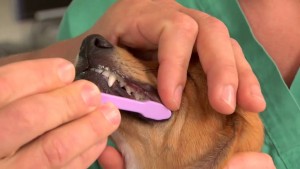
- Complete dentistry, including x-rays, taken under full general anesthesia
- Complete dentistry, done under sedation and with pain medication
- Anesthesia ‘free’ dental procedures done by non-professionals
Which one you choose is up to you and your veterinarian to decide. Most folks are always a little concerned about general anesthesia, and for good reason. Which is why I prefer to evaluate each case on an individual basis, and decide which is the best option. If possible, my preference is to opt for #2. This allows the animal to be calm enough to allow a complete and thorough procedure, and address all areas of the mouth, including a good exam of the back of the throat, under the tongue, and the back sides of the teeth, to look for tumors, growths, broken teeth, or any other abnormalities.
I often see people spend a lot of money on option #3. I have some serious concerns with this approach. Although you are avoiding general anesthesia, no matter how gentle the handler, you are still risking the animal struggling some during the procedure and getting stabbed in the gum with a sharp instrument. Not to mention there is NO WAY you can get the same clear view, fully, inside the entire mouth, with an animal completely awake. Besides, if the animal does struggle and has bleeding gums, wouldn’t you want them to have adequate pain medication on board? I have found very few instances where I have have much confidence or comfort level with someone other than a veterinarian claiming to be able to perform a thorough and adequate dental procedure.
The other extreme is of course general anesthesia, which we all want to avoid. Which is why I really encourage all my clients to take the time it takes, to teach their animal to tolerate teeth brushing. It is really one of, if not THE most important thing you can do for your animal’s long term overall health and longevity.
However, sometimes it is just not possible to avoid the need for a dental procedure under general anesthesia. Such as if there is a badly fractured tooth that definitely need x-rays and extraction. In this case, the best scenario is to do the blood-work before hand to help minimize the risks, and then resign resign yourself to teaching the tooth brushing, so you never have to put your animal through it again.
My personal approach is more middle of the road, and most of my clients seem to really love it! If at all possible, I prefer to do the dental procedure, right at home, so the pet never has to spend time in a scary hospital. I use an excellent sedative with pain medications, and perform the entire procedure right in the comfort of your own home! I scale, polish, and apply fluoride to the teeth, just as in a regular hospital setting. This allows me to alleviate some of the client concerns about general anesthesia, yet still provide an excellent job fully evaluating the entire mouth and all the teeth, while providing appropriate pain medication.
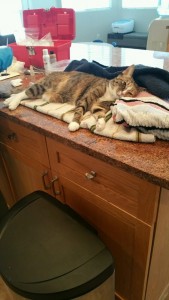
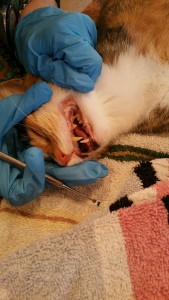
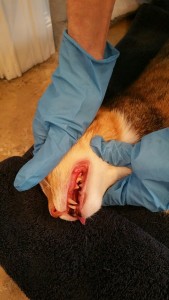
Of course I would still rather spend time encouraging you and teaching you how to train your animal to let YOU brush their teeth, so we don’t have to make any of those choices at all! Doggy or kitty breath is really not something to be taken lightly. Below are some link’s to video’s showing the importance of dental disease and how it affect’s health, how to brush your dog’s teeth, and how to brush your cat’s teeth. So the next time you hug your dog or cat and smell their strong breath, remember it’s time to get better about brushing their teeth, and/or have their mouth examined by your veterinary professional. If you know it’s time to schedule that appointment, we now have on-line booking available on this website. For help or advice on teaching tooth brushing, leave comments below, find me on Facebook, or watch some of the helpful videos below. On that note, I am DrQ, here to help YOU, and your animal, live the longest, healthiest, happiest life possible! Thanks for reading and please share if you like it! A great video about why brushing teeth is important, tools for at home dental care, and a demonstration of brushing your dog’s teeth. Why dental care is so important a good explanation of dental disease in pets. Clicker training a dog to love toothbrushing if you are inclined to clicker training. A good example of how to brush cat’s teeth without much fuss.

